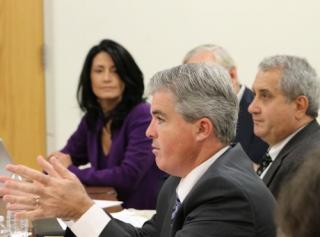Suffolk County Executive-elect Steve Bellone sat scribbling notes in a legal pad yesterday morning in a Cooperative Extension meeting room on Griffing Avenue, as he listened to two dozen farmers and fishermen talk about what's important to sustain the East End's oldest industries.
"I believe the East End is critically important for our regional economy, that it is an extraordinary and special place in our county and in our region," Bellone said as he opened the meeting. "The issues of concern out here will be of the highest priority in our administration," he said.
Bellone introduced the woman he'd just announced would be his chief deputy county executive, Regina Calcaterra of New Suffolk, who serves as the codirector of his transition team. He said Calcaterra is "an extraordinary individual who will be a great advocate for the East End in the administration."
Also accompanying Bellone was the deputy presiding officer of the Suffolk County Legislature, Vivian Viloria Fisher, chair of the legislature's environment, planning and agriculture committee.
Bellone kicked off the discussion by asking, "What is it that you want, what do you need from me as county executive? What do you think I should be doing?"
He got an earful.
Burdensome government regulation was the topic of most concern to the farmers and fishermen who gathered for the meeting.
Long Island Farm Bureau executive director Joseph Gergela asked the county executive-elect for help improving relations with the Suffolk County Department of Health Services.
With lawn fertilizers, sewage treatment plants and a host of other discharge sources, farmers are not the culprits in ground water and surface water pollution, Gergela said, though that's the way they've been treated by regulators.
"Let's figure out how to protect the environment and at the same time protect economic development," Gergela said.
He also asked Bellone for help with state and federal issues, expressing concern over possible "zero tolerance" regulations for pesticides and seeking leadership from the county executive "in setting a reasonable tone" on the immigration issue as lawmakers in Washington consider bills that will have far-reaching impacts on local farmers' ability to employ laborers.
Southold Councilman Albert Krupski, a Cutchogue farmer, said family farmers often find government regulations "overwhelming" and "onerous."
"As a farmer you want to go about your business and produce your food," Krupski said. He said he was encouraged by the diversity and "brain power" assembled in the meeting room. "You need that kind of relationship between government and industry," Krupski said.
He was accompanied by Southold Trustees president Jimmy King, a lobsterman, who said his industry also struggles mightily with government regulation.
Brad Loewen, a former East Hampton town councilman and planning board member who established a fisheries commission in that town, told the county executive-elect that the regulations imposed on the lobster fishery are crippling and came close to killing the Long Island lobster industry altogether with a five-year moratorium proposed last year.
Commercial fisherman John Davi of Port Jefferson Station, a member of the state's Marine Resource Advisory Council, told Bellone one of the biggest problems facing commercial fishermen today is restrictions imposed by the federal government.
"The small quantity they allow us to keep make it very hard to sustain a living here on Long Island," Davi said. "No matter what you say to them," he said of federal regulators, "they just don't get it."
Davi predicted the Long Island Sound, which he said is primarily where he fishes, is going to transition from commercial fishing to aquaculture.
"We can all agree that we want to see farming and the marine economy grow in a sustainable way," Bellone said. "We will be very focused on all of those things," he said after listening to their concerns.
Funding for research, development and initiatives to promote the East End industries and economy was also a hot topic.
Gergela told Bellone the farm bureau wants to see a portion of the funds collected by the county for land preservation "dedicated for farmland." He said the county began comingling farm preservation funds with open space funds about a decade ago.
"We're not opposed to open space funding. But we don't want to have to compete with open space funding in order to preserve the critical mass of farmland we need to sustain the industry going forward," Gergela said.
Gergela also pitched for financial support for the county's cooperative extension program. The farm bureau relies on the cooperative extension for expertise in aquaculture, Gergela said.
"We want to make sure Cornell Cooperative Extension is relevant and important to the county executive," he said.
County agencies had a 5 percent across-the-board budget cut in the 2012 county spending plan approved at the last legislative meeting. The extension program got hit harder, taking a 14 percent cut, CCE executive director Vito Minei said yesterday. Two important programs — the 4H program and the family health and wellness program saw their funding eliminated altogether, he said.
Farm bureau president Frank Beydrot said he'd like to see the county have one or more large farmers markets operating consistently.
Long Island Wine Council president Ron Goerler and executive director Steve Bate spoke about the wine region as an economic generator for the county, and the importance of tourism — especially winter tourism — to the profitability and sustainability of vineyards and wineries.
County Legislator Ed Romaine, who had a scheduling conflict and couldn't attend the roundtable, submitted a two-page written statement seeking support for farmland preservation, aquaculture, the Winterfest/Jazz on the Vine series, and Cornell Cooperative Extension.
The soon-to-be-former Babylon Town supervisor was pleased with the discussion.
"One of the things I enjoy in government is eliminating or changing the things that don't make sense," Bellone said as he wrapped up the meeting. "I'm interested in creating that agenda, focused on what we need to do to grow the industry, on what we can change or modify that will have a positive impact on growing the industry, and changing things that dont makse sense."
After the meeting, Gergela said Bellone's openness and willingness to listen were "refreshing."
The Long Island Farm Bureau cohosted the meeting with Cornell Cooperative Extension of Suffolk County, which presented Bellone with a — leaking — insulated bag of Peconic Bay scallops on ice.
"I hope that's not symbolic of our relationship," Minei joked as he handed Bellone the bag.

